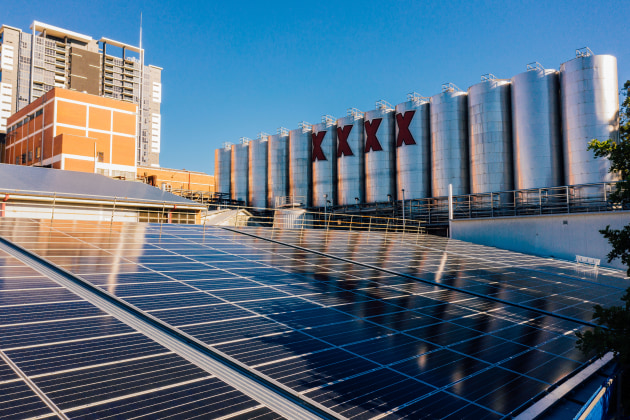Brewing giant Lion is set to remove 630 tonnes of plastic per year through its latest sustainability target of removing plastic shrink-wrap and plastic beer bottle labels by 2023.
The plastic shrink-wrap – currently found on six packs of cans and bottles for brands including XXXX, Tooheys, and James Boag’s – will be completely eliminated in the next two years, the company said.
For the XXXX brand alone, removing shrink-wrap will reduce its total plastic use by 70 per cent.
Lion’s head of sustainability Libby Davidson said it was undoubtedly an aggressive strategy.
“We have challenged ourselves and taken a number of steps further than many other players in our industry by putting forward a detailed and transparent commitment with clear objectives and timeframe,” Davidson said.
“But we can go further, and we’ve identified an opportunity here to address two significant sources of plastic in our supply chain.”
The second component is its pledge to transition away from plastic labels on beer bottles and replace them with sustainable alternatives such as biodegradable labels or paper versions by the end of the decade.
“Lion has been a pioneer in sustainable packaging. We were the first major Australian brewer to stop using plastic rings in six-packs, and we’re already closing in on a goal of 100 per cent recyclable plastic packaging and 50 per cent recycled content,” she said.
Over the next 12 months the brewer will work with its packaging suppliers to develop alternatives to shrink-wrap. Its goal is to remove shrink-wrap from six-packs of cans by the end of this year, with stubbies and long necks to follow.
The combined effect of both initiatives will cut Lion’s plastic use in the market by more than half.
Davidson said this was the latest step in Lion’s commitment to do the right thing for the environment and create a positive legacy.
“We’ve been conscious of the environmental impact of our packaging for a long time and have been taking deliberate steps to reduce this impact.
“This is a significant acceleration in a journey we have been on since 2010 when we were the first brewer to begin removing the notoriously damaging plastic rings from our products,” she said.

In 2020, Lion became Australia’s first large-scale carbon-neutral brewer and is on track to reduce its absolute carbon footprint by 30 per cent by 2025.
Its ‘whole brewery’ reduction approach includes energy efficiency initiatives, biogas utilisation, rooftop solar, renewable energy power purchase agreements, as well as providing brewers grain to reduce livestock emissions.
Recently, Lion has partnered with REDcycle to promote soft plastic recycling, and while the transition is underway consumers can continue to recycle shrink-wrap packaging from Lion products through REDcycle at major supermarkets right across Australia.








